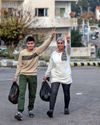
Last summer, as Washington tried to coax Saudi Arabia towards the grand bargain of normalisation of its relations with Israel, diplomats in Riyadh were much more focused on securing a different peace deal on its southern borders with one of the most successful insurgencies of modern times - the one led by the Houthi rebels of Yemen.
With an informal ceasefire holding inside Yemen, and after months of private talks mainly mediated in Oman, on 14 September a Houthi delegation flew to Riyadh, where they met Prince Khalid bin Salman, the defence minister and brother of the crown prince.
Major differences remained to be settled, but it seemed as if, after decades of fighting, peace was to come to the country, and largely on the terms dictated by a group that did not really exist as a political force inside Yemen until the early 2000s. Saudi Arabia was finally going to cut its losses on the disastrous offensive it launched in 2015 to push back the Houthis. Yet 23 days after the Riyadh meeting, Hamas broke through the border with Israel, massacring Israelis and sparking a chain of events that last week left Yemen exposed to a two-day attack from US and British submarines and warships on the Red Sea.
The attacks on Houthi bases in Yemen, as well as ratcheting up the tension in a region already gripped by violence, took Yemen further away from elusive internal peace.
Two factors are adding to the complexity of a region riven by conflict: the Houthis' support for the Palestinian cause, and the way Yemen's geography helps shape political dynamics. As the writer Iona Craig observes, Yemen is a quintessential example of geopolitics the place where geography and politics come together.
Diese Geschichte stammt aus der January 19, 2024-Ausgabe von The Guardian Weekly.
Starten Sie Ihre 7-tägige kostenlose Testversion von Magzter GOLD, um auf Tausende kuratierte Premium-Storys sowie über 8.000 Zeitschriften und Zeitungen zuzugreifen.
Bereits Abonnent ? Anmelden
Diese Geschichte stammt aus der January 19, 2024-Ausgabe von The Guardian Weekly.
Starten Sie Ihre 7-tägige kostenlose Testversion von Magzter GOLD, um auf Tausende kuratierte Premium-Storys sowie über 8.000 Zeitschriften und Zeitungen zuzugreifen.
Bereits Abonnent? Anmelden

'It's really a disaster' The fight to save lives as gang war consumes capital
Dr James Gana stepped out on to the balcony of his hospital overlooking a city under siege. \"There's a sensation of 'What's next?'. Desperation is definitely present,\" the Médecins Sans Frontières (MSF) medic said, as he stared down at one of scores of camps for displaced Haitians in their country's violence-plagued capital.

Trailblazers The inspiring people we met around the world this year
From an exuberant mountaineer to a woman defiantly facing the guns of war, here are some of the brave individuals who gave us hope in a tumultuous 2024

Votes of confidence
From India to Venezuela and Senegal to the US, more people voted this year than ever before, with over 80 elections across the world. With rising authoritarianism and citizen-led resistance revealing its vulnerabilities and resilience in the face of unprecedented challenges, has democracy reached its breaking or turning point?

Out of touch How president sealed his own fate in martial law gambit
For Yoon Suk Yeol, this month's short-lived martial law declaration wasn't just a catastrophic miscalculation - it was the culmination of a presidency that had been troubled from the start.

Son of the soil Who is François Bayrou, the farmer turned prime minister?
François Bayrou, the new French prime minister, calls himself a country man. A tractor-driving \"son of the soil\" and breeder of thoroughbreds, he has run for president three times, saying his rural roots and centrist politics led him to try to find common ground between left and right.

Power plant workers keeping the lights on
The Guardian Weekly visits a Soviet-era coal-fired thermal installation to learn how it has held up to Russian attacks

Prince charmed Alleged spy scandal may have exposed China threat
Prince Andrew should be commended for doing Britain a great service, according to longstanding China watcher Charles Parton. The now marginalised royal has, the analyst observed, \"almost single handedly\" succeeded \"in highlighting the threat to free and open countries\" posed by the contemporary Chinese state.

In Moscow, a new life of secluded irrelevance awaits Assad
He was whisked away without a last message to his people, the aircraft's transponder deliberately switched off to avoid detection as it departed from an airbase in Syria.

'We fear new oppression' Alawites worry over rebel rule
To prepare khubeiza, the leaves of the kale-like plant must be roughly chopped and sauteed with onions, garlic and a dash of salt. According to folklore, the recipe originated among the Alawite communities who lived in Syria's mountainous coastline where the fibrous, wild-growing plant can be found in abundance. So poor were the Alawites in Ottoman times, the story goes, that the only food they could find to eat was khubeiza, which sprouts like a stubborn weed every spring.

'Gisèle is waiting for explanations'
The Pelicot rape trial has horrified the world. But as it comes to an end, the questions it has raised about French society and rape culture have still not been answered.